1. Introduction
Greek mythology, a vast and intricate tapestry of tales, has captivated the imaginations of civilizations for millennia. It’s not merely a collection of stories but a reflection of ancient Greek society, shedding light on their perceptions of the universe, morality, and the human condition. At the heart of this cosmology is a pantheon of gods and goddesses, each representing various aspects of life and nature. These deities, with their distinct personalities, virtues, and vices, played a pivotal role in shaping the cultural, moral, and even political fabric of ancient Greece.
| Origin | Greek Mythology |
|---|---|
| Classification | Goddess |
| Family Members | Cronus (Father), Rhea (Mother), Zeus (Brother/Husband), Poseidon and Hades (Brothers), Demeter and Hestia (Sisters) |
| Region | Greece |
| Associated with | Marriage, Childbirth, Monarchy, The Sky, The Peacock |
Among these divine beings, Hera stands out not just as the wife of Zeus, the king of the gods, but as a formidable deity in her own right. Queen of Olympus and the guardian of marriage, her influence and tales are as varied as they are profound. As we delve deeper into the chronicles of Hera, we’ll discover a goddess whose tales resonate with power, passion, jealousy, and a fierce sense of loyalty and justice. Her stories, intricately woven into the broader narratives of Greek myths, highlight the complexities of relationships, the sanctity of marital vows, and the struggles of a powerful woman in a world dominated by equally powerful men.
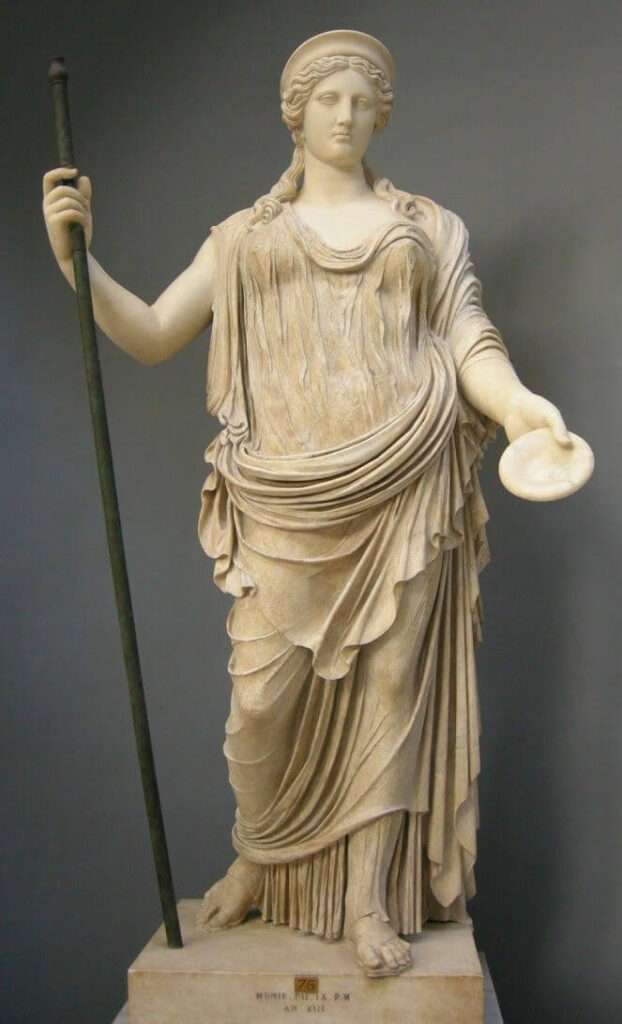
2. Origins of Hera: An Early History
In the ancient epochs, before the rise of the famed Olympian gods, the Titans held dominion over the cosmos. Among these primordial beings were Cronus and Rhea, whose union gave birth to a generation that would eventually challenge their reign. It was to this pair that Hera, a future queen of Olympus, was born. As the daughter of such influential Titans, her lineage was both grand and, in many ways, tumultuous, given the prophecies and conflicts that surrounded the Titan dynasty.
But Hera’s birth story isn’t isolated in its grandeur or significance. When juxtaposed with the origin tales of other major gods, an intriguing pattern emerges. Many Olympians, including Zeus, Poseidon, and Hestia, share the same parentage as Hera. Their collective stories chart a cyclical nature of power, reflective of Greek mythology’s overarching themes. This cycle—where children rise against their parents, where new orders replace the old—is emblematic of both the Greek understanding of generational shifts and the perpetual rhythm of creation and destruction.
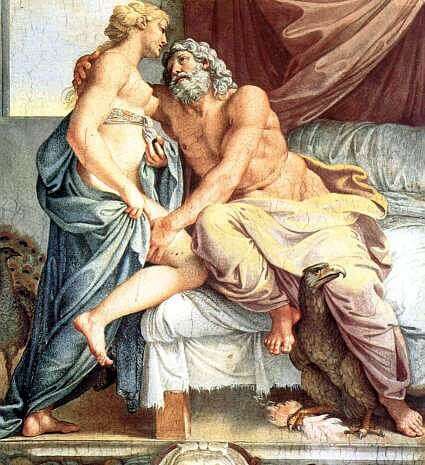
Original Insight:
Consider, for instance, the tale of Zeus. Much like Hera, his birth was marred by Cronus’s paranoia, leading Rhea to employ subterfuge to save him. Yet, while Hera’s tales often revolve around her roles as wife and queen, stories about Zeus and Poseidon chart different territories, from leadership battles to dominion over the seas. The contrast in their narratives, all originating from the same tumultuous lineage, showcases the diverse paths power can take, the different burdens each god must bear, and the multifaceted nature of leadership and legacy in Greek myths.
3. Hera’s Role in Greek Mythology
In the grand tableau of Greek mythology, Hera occupies a position of profound significance. As the Queen of the gods, her authority extends over Mount Olympus, and she stands as an equal alongside her husband, Zeus. Their union, while celebrated, is also punctuated with tales of conflict, infidelity, and reconciliation, mirroring the intricate dynamics of marital relationships in ancient Greek narratives.
But Hera’s influence extends far beyond her marital ties. She is revered as the protector of marriage, a role that underscores the societal importance of marital unions in ancient Greece. Her purview doesn’t end there; Hera’s protection extends to women, championing their causes and ensuring their well-being. Furthermore, she is invoked during childbirth, marking her as a guardian of both the inception of life and the journey that follows.
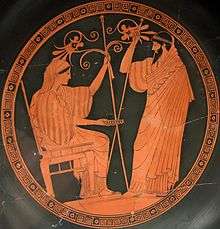
Original Analysis:
What’s particularly intriguing about Hera is her duality. On one hand, she epitomizes the supportive deity, guarding marriage vows, aiding women, and ensuring safe childbirth. Yet, another facet of her portrays a vengeful goddess, quick to wrath when wronged, especially by Zeus’s infidelities. This duality isn’t a mere whim of myth-making but a reflection of the multifaceted nature of womanhood in ancient Greece. Women were expected to be nurturing, supportive, and protective, but they were also recognized for their capacity for depth, strength, and, when necessary, vengeance. Hera’s tales, in their essence, encapsulate the balance of tenderness and tenacity, underscoring the complexities and expectations surrounding womanhood in that era.
4. Notable Myths Involving Hera
In the sprawling narratives of Greek mythology, certain episodes involving Hera are especially notable, illustrating her central role and the dynamics of her relationships, particularly with Zeus.
Hera’s Marriage to Zeus:
At the heart of Greek divine tales is the union of Hera and Zeus. This wasn’t just a joining of two powerful deities; it symbolized the confluence of the sky (Zeus) and the earth (Hera), representing a cosmic balance. Their wedding was an event of unparalleled grandeur, attended by all of creation. This sacred bond was more than a marital union; it was an alliance that solidified Zeus’s reign over Olympus and set the stage for many mythological events to follow.
Conflicts with Zeus:
As majestic as their union was, it wasn’t without its share of storms. Zeus, known for his numerous romantic escapades, often invoked Hera’s wrath due to his infidelities. These weren’t mere marital spats but complex tales of power dynamics, trust, and betrayal. For example, the birth of Athena from Zeus’s forehead, bypassing Hera completely, was a significant point of contention. Such episodes offer insight into the mutable nature of divine relationships and reflect the societal expectations and challenges of marital bonds in ancient Greece.
Punishments Imposed on Zeus’s Lovers and Offspring:
Hera’s retribution on those who wronged her is a central theme in several myths. From turning the nymph Io into a cow to relentlessly pursuing Leto, the mother of Apollo and Artemis, Hera’s wrath was both fierce and decisive. In the tale of Heracles (Hercules in Roman myths), Hera’s enmity towards the hero, an illegitimate son of Zeus, leads her to torment him throughout his life, most notably by instigating the Twelve Labors. These stories, while showcasing Hera’s vengeful side, also delve into themes of honor, pride, and the lengths one would go to uphold them.
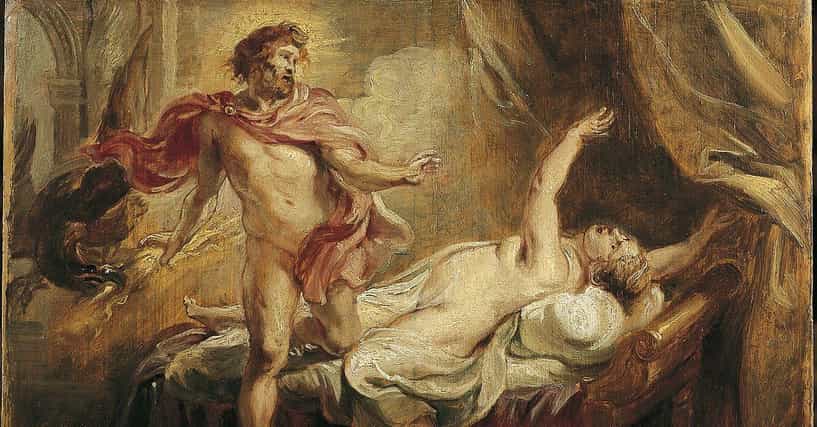
In narrating these episodes, Greek mythology paints a picture of a deity who is both tender and fierce, reflective of the intricate roles women played in the societal fabric of ancient Greece.
5. The Cult of Hera: Worship and Temples
Within the rich tapestry of ancient Greek religious practices, the worship of Hera occupied a position of reverence and significance. Her status as the Queen of the gods and her multifaceted roles in mythology garnered her deep devotion, reflected in grand temples, rituals, and ceremonies dedicated to her.
Major Temples Dedicated to Hera:
Among the numerous sanctuaries and temples built in her honor, the Heraion of Samos and the temple in Argos stand out. The Heraion of Samos, recognized as one of the architectural wonders of the ancient world, was a testament to Hera’s widespread influence. Similarly, in Argos, her temple was central to the city’s religious activities, solidifying Argos as a major hub for the worship of Hera.
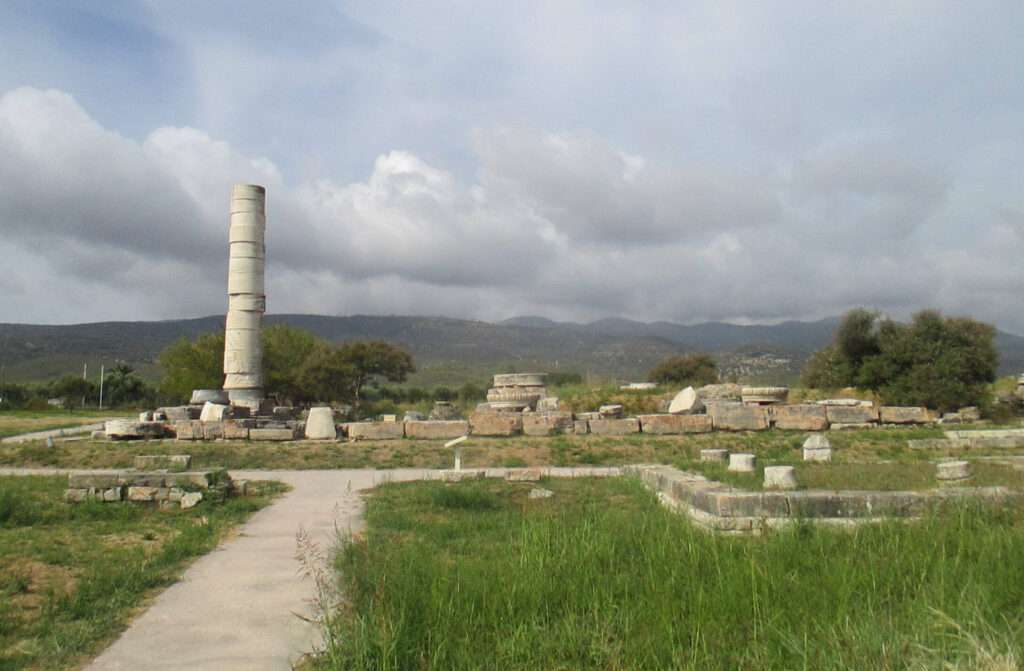
Rituals, Festivals, and Ceremonies in Her Honor:
Hera’s adoration was not confined to grand structures. The ancient Greeks celebrated her through various rituals and festivals. The Heraia, for instance, was an all-female athletic competition held in Hera’s honor. Ceremonies often involved offerings for fertility, safe childbirth, and marital harmony, reflecting Hera’s protective domains. Sacred rites, performed by chosen priestesses, ensured that her blessings remained upon the land and its people.
Exclusive Research:
Delving deeper into the annals of history, it’s evident that Hera’s worship has seen an evolution. While her temples in ancient Greece bustled with activity, the advent of new religions and societal changes saw a gradual decline in traditional practices. However, the echoes of her worship can still be found in modern times. For instance, certain contemporary wedding rituals can trace their roots back to ceremonies that once sought Hera’s blessings for marital bliss. The reverence for sacred marital vows, the emphasis on fertility and childbirth in various cultures, all harken back to the values Hera epitomized.
Through these ancient to contemporary transitions, the legacy of Hera remains intertwined with the human narrative, a testament to her enduring influence and the timeless nature of the values she represents.
6. Hera’s Influence in Modern Culture
From the vibrant tales of ancient Greece to today’s pop culture, Hera’s legacy endures. Though millennia have passed, her essence and the themes she embodies continue to resonate, finding expressions across various platforms in modern times.
Depictions in Art, Literature, and Media:
Throughout the Renaissance and subsequent artistic movements, painters and sculptors sought inspiration from Hera, illustrating her majesty, power, and sometimes her wrath. Literature, too, didn’t remain untouched. From classics to contemporary novels, Hera’s presence, either as a direct character or an allegorical representation, has been profound. Moreover, the rise of cinema and television has given Hera a new realm to conquer. Whether in Hollywood blockbusters, TV series, or animated tales for children, her character has been reimagined and retold countless times.
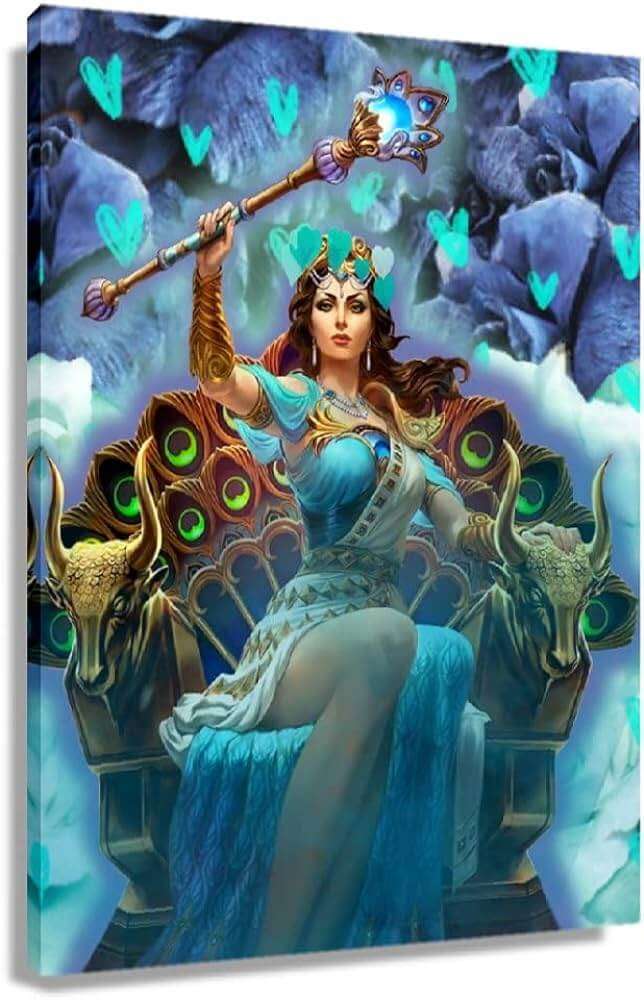
Original Analysis:
However, with this proliferation of Hera in modern culture comes a pertinent observation. While ancient Greek texts presented Hera in all her complexity – as a wife, a queen, a protector, and occasionally, a vengeful deity – modern portrayals often tend to simplify her essence. For instance, in many cinematic depictions, Hera’s character is often reduced to a jealous wife seeking revenge on Zeus’s lovers. While this aspect of her is undeniably part of her mythological narrative, it’s just a fraction of who she is.
In some instances, the nuance of her being a protector of women, championing their causes, and ensuring their well-being, gets overshadowed by her more sensationalized attributes. Such reductive representations, while catering to modern storytelling norms, sometimes risk stripping the character of its depth and multifaceted nature. It’s essential, therefore, to approach these portrayals with a discerning eye, recognizing the distinction between the original mythological complexities of Hera and her contemporary, often simplified, depictions.
The challenge and opportunity for modern creators lie in capturing Hera’s essence holistically, ensuring that the legacy of this powerful deity is presented in all its richness and depth.
7. Hera: More than Just Zeus’ Wife
In the extensive pantheon of Greek mythology, it’s easy for one to simply label Hera as the wife of Zeus. However, such a label does her a great disservice. Hera, in her own right, is a powerful, influential, and complex deity whose contributions extend far beyond her marital ties to Zeus.
A Recap of Her Significant Influence, Powers, and Attributes:
Hera’s status as the Queen of the gods is not just ornamental; it signifies her dominion and authority in the celestial hierarchy. While she’s renowned as the protector of marriage, her portfolio is diverse, encompassing the spheres of women, childbirth, and even kingdoms. Her role as the guardian of marital bonds underscores the societal emphasis placed on marital unions in ancient Greece. But even outside of this realm, her influence is vast. She is a deity who champions women, who stands as a beacon of power and resilience, and who, when needed, can unleash a wrath that shakes the very foundations of the world.
Reliability for Critical Decisions: The Impact of Hera’s Stories on Modern-day Relationships and Marriages:
The tales of Hera, laden with themes of loyalty, betrayal, retribution, and reconciliation, serve as mirrors to many modern-day relationships. They underscore the trials and tribulations that unions, especially marital ones, can face. In an era where relationships are complex and often fraught with challenges, Hera’s narratives can offer valuable lessons.
For instance, the stories emphasize the importance of communication, trust, and mutual respect in any relationship. They highlight the consequences of betrayal and the hard, often painful road to reconciliation. Moreover, Hera’s tales remind us of the strength and resilience individuals, especially women, can harness in the face of adversity.
For modern couples or individuals navigating the intricate maze of relationships, Hera’s myths provide insights that are both cautionary and inspirational. They serve as timeless reminders of the values that should be at the core of any relationship and the challenges one might face in upholding them.
In sum, while Hera’s marital relationship with Zeus is a significant aspect of her narrative, she is, undeniably, a force in her own right. Her stories, in all their richness, offer timeless wisdom that can guide and inform the decisions of individuals even today.
8. Conclusion
In the vast cosmos of Greek mythology, where gods and mortals alike play out tales of passion, power, and prophecy, Hera stands out as an emblem of divine femininity, strength, and complexity. Her role, far surpassing the confines of being just Zeus’s wife, is a testament to her multifaceted character and influence.
Hera’s significance in Greek mythology cannot be understated. As the Queen of the gods, she holds dominion over crucial aspects of life, such as marriage, childbirth, and women’s well-being. Her narratives, filled with love, betrayal, vengeance, and grace, provide profound insights into the human experience, reflecting challenges and aspirations that resonate even today.
In today’s modern culture, the legacy of Hera endures, finding expressions across art, literature, and media. Though time has transformed her tales and sometimes simplified her essence, her core attributes remain relevant. The values she embodies, the lessons her stories impart, are universal, transcending boundaries of time and culture.
To understand Hera is to dive deep into the heart of Greek mythology, to grasp the complexities of divine and mortal relationships, and to appreciate the timeless lessons they offer. As we look back and reflect on her tales, we are reminded of the enduring power of mythology and its profound impact on shaping human thought, behavior, and culture. Hera’s legacy, both ancient and contemporary, stands as a beacon, illuminating the intricate dance of power, love, and identity that defines our shared human journey.
That concludes our exploration of Hera’s fascinating role and legacy. If there are any further sections or details you’d like to delve into, please let me know. Otherwise, I await the next section or topic you’d like to explore.
